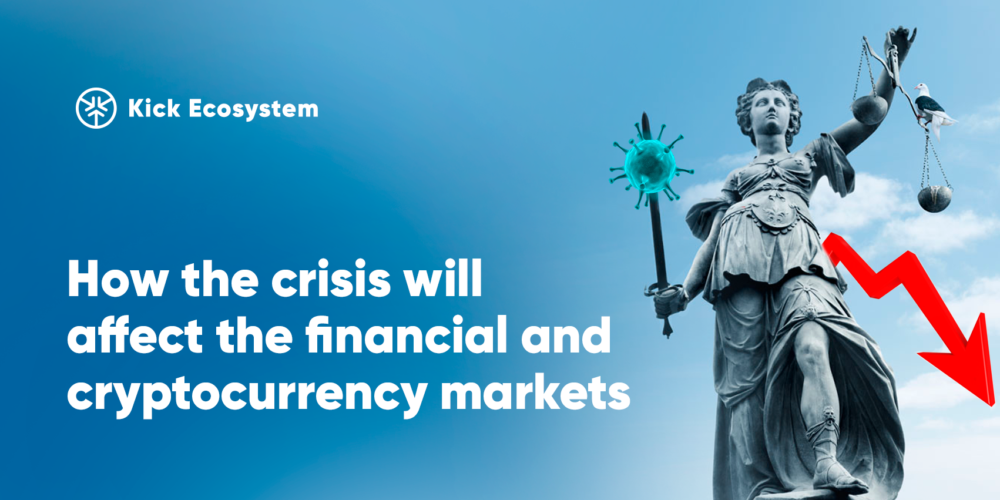The panic caused by the coronavirus is currently the main topic for discussion throughout the world, and the crypto-community is no exception. What can we expect from the digital currency market in the context of recent events?
The founder of the Kick Ecosystem platform and the KickEX crypto exchange, Anti Danilevski, examines the link between global stock markets and the crypto industry, and how a financial crisis caused by the spread of the coronavirus might affect these two worlds.
March 27, 2020 By Anti Danilevski
Founder & CEO of Kick Ecosystem
My thoughts have not changed much over the past year. The crisis was expected. Market recession in the US was predicted back in 2018, and in 2019 the trend was confirmed. The pandemic and its ensuing panic will likely trigger recession everywhere. The recent collapse of the oil market has only added to the hysteria.
However, where some view a crisis as only a crushing loss, others identify significant opportunity. For the cryptocurrency market, any recession in the classical financial market is beneficial, since there are very few traditional assets in the world that will not fall in price during economic instability. Gold is considered one of these few assets.
But, since the advent of the new class of assets known as cryptocurrencies, it is bitcoin that is increasingly quoted as a means of maintaining value. But, with its short history, the first cryptocurrency is yet to encounter world market collapses, making it difficult therefore to predict its behaviour in such conditions.
Market falls have already occured, are happening now and will happen in the future
On March 13, the price of bitcoin fell below $4,000, featuring a ten-month low. But such a fall cannot be called dramatic, since more dynamic dumps have already happened in its history, including the loss of more than 60% of the daily value. Therefore, it is too early to draw conclusions about the long-term prospects of its price.
During the crypto-winter, we saw how the price of bitcoin fell to $3,000, and, more recently, we witnessed it overcome the psychological border of $10,000 for 1 BTC. This has demonstrated to many wealthy people that cryptocurrencies can be used as a profitable economic asset.
Further, even if the price of bitcoin collapses again, sooner or later it will return to the one at which the asset was bought. Such high volatility also provides the opportunity to double, or even triple, the initial capital invested, if the time to enter the market was chosen correctly. Because of this, even ardent supporters of fiat and other traditional assets have diversified their portfolios, making bitcoin one of the most powerful tools for protecting investments against risks.
It is no secret that the negative correlation of bitcoin with the S&P 500 index and price fluctuations made BTC one of the most important hedging tools. In addition, back in August 2019, the TradeBlock research firm announced that bitcoin brought more stable risk-adjusted returns than both gold or the S&P 500 index. So, from August 13, 2018 to August 9, 2019, bitcoin had a Sortino coefficient of 1.97, while this indicator for gold was 1.06, and 0.25 for the S&P 500.
Lack of regulation reinforces fear
The conflict between the US and China, in my opinion, had no effect on the value of bitcoin and other cryptocurrencies. When the ceasefire comes, this will likewise not affect price.
The price is affected by the penetration of cryptocurrencies into the lives of the masses and, I will not tire of repeating — their regulation. Investors remain afraid of losing their assets in most countries due to cryptocurrencies lacking a clear legal status. For this reason, they also cannot defend their interests in court if something untoward occurs.
In Russia, it is still not clear what kind of future awaits the cryptocurrency industry. Fear, confusion and vacillation persist amongst those deciding the future of the cryptocurrency market there. The situation is similar in many other countries, which negatively affects the reputation of the whole industry, inhibiting potential users from buying digital assets, which is reasonable. Thus, the situation with coronavirus infection is not a decisive factor determining market growth in crypto assets.
A change in leadership
I am confident that the widespread adoption and regulation of cryptocurrencies, rather than their prohibition, is only a matter of time. In addition, I believe regulation will arise to protect investors who participate in ICOs, AIOs and STOs.
As for exchanges and the cryptocurrency trading market, I continue to expect a “big purge”, where manipulators and dishonest players who work illegally will be punished. More and more exchanges will be closed due to their providing unreliable, low-quality or simply outdated services. In 2020-2021, we await a change in the leaders of the cryptocurrency market, along with the appearance of technologically more secure and advanced platforms.
I am sure that the cryptocurrency market is still in its beginning stage. All those working in it are the real pioneers, and we shall be the ones to pluck the most delicious cherry from its top.

